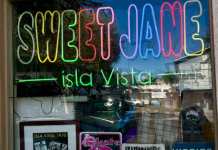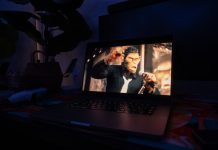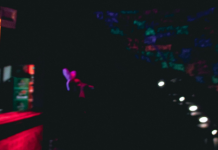Kyle Roe
Copy Editor
Don Hertzfeldt found the inspiration for his latest short film, World of Tomorrow, in an extremely unlikely place: the random, often inane ramblings of his 4-year-old niece, Winona Mae.
“I had pieces of the story, and I knew where it wanted to go and some things I wanted to see it do, but I knew I needed a little girl voice and I didn’t want to fake it,” Hertzfeldt said. “I didn’t want to do one of those cartoons where you have a grown-up doing a fake, cartoon-y kind of voice. It just doesn’t feel right; it doesn’t feel real.”
The resulting movie won him an Oscar nomination and a warm homecoming from his alma mater, the University of California, Santa Barbara, at Pollock Theater, where World of Tomorrow was screened in the latest installment of the Carsey-Wolf Center’s Script to Screen series. The theater was packed with UCSB students and faculty, and other residents of the greater Santa Barbara community, eager to ask Hertzfeldt questions and listen to him speak about filmmaking, the selfishness of immortality and why morbid humor is often the most effective way to make people laugh.
World of Tomorrow is abundant with dark humor, albeit dark humor written to complement the childish dialogue of 4-year-old Emily Prime, voiced by real-life 4-year-old Mae, recorded by Hertzfeldt when they were drawing and sculpting with Play-Doh one day in late 2013.
“[Mae] lives in Scotland, so I only get to see her maybe once a year,” Hertzfeldt said. He taped their conversation using an app on his iPad to keep pressure at a minimum. “It really is just her being herself 100%.”
The simplicity with which Hertzfeldt’s 2D stick-figure characters are drawn adds to Tomorrow’s childlike feel. They are superimposed on ever-changing background visuals that range from the nonsensically meandering shapes of the Outernet, to a raging Ice Age blizzard, to abstract snippets of video arranged to imitate “pretentious” art exhibitions of the present. Right by Emily Prime’s side is her emotionally detached, time-travelling clone, who rarely fails to surround Mae’s playful dialogue with a hearty dose of dystopian gloom.
In one scene, the two of them are standing on a nondescript hillside looking up at the stars. Emily’s clone starts lecturing Emily Prime on an impending disaster easily avoided by the rich, unfolding in the valley below them, who download their consciousnesses into cubes for cloning.
However, the lower classes are forced to rely on glitchy, unreliable “discount time travel,” that sometimes propels people to the wrong location, “causing untold millions to die in orbit,” and become shooting stars for the rich to enjoy. Emily Prime blurts out, “Look! There’s another one!” as another shooting star streaks across the night sky. She then gets excited and begins counting them.
Hertzfeldt mentioned that the lack of regard for Emily’s safety illustrates “the selfishness of being a clone. The only goal is living forever, but somewhere along the line the quality of life has disappeared and the only goal is to selfishly keep perpetuating.”
He further described the clones as, “a Xerox of a Xerox of a Xerox,” since they survive by cloning each other after all the “originals” die out, that lose minute aspects of their identity and humanity with each successive copy. Emily’s clone is her third reiteration, and is described by Hertzfeldt as, “Mary Poppins, but with part of her brain missing.”
After Ryan completed his interview, the audience was treated to a showing of Billy’s Balloon, one of Hertzfeldt’s student films from his time at UCSB. There was no dialogue, only the prolonged violent assault of a stick-figure child by his red balloon, leading to an outburst of helium-filled mob violence against a group of unsuspecting kids. The only thing louder than the practical symphony of dull blows was the audience’s sustained laughter.
“I think it was Spielberg who said, ‘The cheapest, easiest way to get an emotional response is to put a child in danger,’” Hertzfeldt opined. If that laughter-filled night at the Pollock Theater, not to mention his entire catalogue of films, are any indicator, bringing out peoples’ emotions seems to be Don Hertzfeldt’s specialty.











